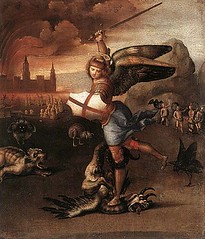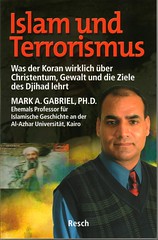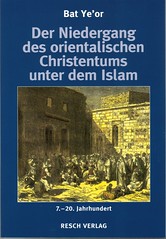I have said throughout these pages that the particular quality of Mohammedanism, regarded as a heresy, was its vitality. Alone of all thegreat heresies Mohammedanism struck permanent roots, developing a life ofits own, and became at last something like a new religion. So true is this that today very few men, even among those who are highly instructed inhistory, recall the truth that Mohammedanism was essentially in its origins a new religion, but a heresy. Like all heresies, Mohammedanism lived by the Catholic truths which it had retained. Its insistence on personal immortality, on the Unity and Infinite Majesty of God, on His Justice and Mercy, its insistence on the equality of human souls in the sight of their Creator -- these are its strength. But it has survived for other reasons than these; all the other great heresies had their truths as well as their falsehoods and vagaries, yet they have died one after the other. The Catholic Church has seen them pass, and though their evil consequences are still with us the heresies themselves are dead. The strength of Calvinism was the truth on which it insisted, the Omnipotence of God, the dependence and insufficiency of man; but its error, which was the negation of free-will, also killed it. For men could not permanently accept so monstrous a denial of common sense and common experience. Arianism lived by the truth that was in it, to wit, the fact that the reason could not directly reconcile the opposite aspects of agreat mystery -- that of the Incarnation. But Arianism died because it added to this truth a falsehood, to wit, that the apparent contradiction could be solved by denying the full Divinity of Our Lord. And so on with the other heresies. But Mohammedanism, though it also contained errors side by side with those great truths, flourished continually, and as a body of doctrine is flourishing still, though thirteen hundred years have passed since its first great victories in Syria. The causes of this vitality are very difficult to explore, and perhaps cannot be reached. For myself I should ascribe it in some part to the fact that Mohammedanism being a thing from the outside, a heresy that did not arise from within the body of the Christian community but beyond its frontiers, has always possessed a reservoir of men, newcomers pouring in to revivify its energies. But that cannot be a full explanation; perhaps Mohammedanism would have died but for the successive waves of recruitment from the desert and from Asia; perhaps it would have died if the Caliphate at Baghdad had been left entirely to itself; and if the Moors in the West had not been able to draw upon continual recruitment from the South. Whatever the cause be, Mohammedanism has survived, and vigorously survived. Missionary effort has had no appreciable effect upon it. It still converts pagan savages wholesale. It even attracts from time to time some European eccentric, who joins its body. But the Mohammedan neverbecomes a Catholic. No fragment of Islam ever abandons its sacred book, its code of morals, its organized system of prayer, its simple doctrine. In view of this, anyone with a knowledge of history is bound to ask himself whether we shall not see in the future a revival of Mohammedan political power, and the renewal of the old pressure of Islam upon Christendom. We have seen how the material political power of Islam declined very rapidly during the eighteenth and nineteenth centuries. We have just followed the story of that decline. When Suleiman the Magnificent was besieging Vienna he had better artillery, better energies and better everything than his opponents; Islam was still in the field the material superior of Christendom -- at least it was the superior in fighting power and fighting instruments. That was within a very few years of the opening of the eighteenth century. Then came the inexplicable decline. The religion did not decay, but its political power and with that its material power declined astonishingly, and in the particular business of arms it declined most of all. When Dr. Johnson's father, the bookseller, was setting up business at Lichfield, the Grand Turk was still dreaded as a potential conqueror of Europe; before Dr. Johnson was dead no Turkish fleet or army could trouble the West. Not a lifetime later, the Mohammedan in North Africa had fallen subject to the French; and those who were then young men lived to see nearly all Mohammedan territory, except for a decaying fragment ruled from Constantinople, firmly subdued by the French and British Governments. These things being so, the recrudescence of Islam, the possibility of that terror under which we lived for centuries reappearing, and of ourcivilization again fighting for its life against what was its chief enemy for a thousand years, seems fantastic. Who in the Mohammedan world today can manufacture and maintain the complicated instruments of modern war? Where is the political machinery whereby the religion of Islam can play anequal part in the modern world? I say the suggestion that Islam may re-arise sounds fantastic -- but this is only because men are always powerfully affected by the immediate past: -- one might say that they are blinded by it. Cultures spring from religions; ultimately the vital force which maintains any culture is its philosophy, its attitude toward the universe; the decay of a religion involves the decay of the culture corresponding to it -- we see that most clearly in the breakdown of Christendom today. The badwork begun at the Reformation is bearing its final fruit in the dissolution of our ancestral doctrines -- the very structure of our society is dissolving. In the place of the old Christian enthusiasms of Europe there came, for a time, the enthusiasm for nationality, the religion of patriotism. But self-worship is not enough, and the forces which are making for the destruction of our culture, notably the Jewish Communist propaganda from Moscow, have a likelier future before them than our old-fashioned patriotism. In Islam there has been no such dissolution of ancestral doctrine -- or, at any rate, nothing corresponding to the universal break-up of religion in Europe. The whole spiritual strength of Islam is still present in the masses of Syria and Anatolia, of the East Asian mountains, of Arabia, Egypt and North Africa. The final fruit of this tenacity, the second period of Islamic power, may be delayed: -- but I doubt whether it can be permanently postponed. There is nothing in the Mohammedan civilization itself which is hostile to the development of scientific knowledge or of mechanical aptitude. I have seen some good artillery work in the hands of Mohammedan students of that arm; I have seen some of the best driving and maintenance of mechanical road transport conducted by Mohammedans. There is nothing inherent to Mohammedanism to make it incapable of modern science and modern war. Indeed the matter is not worth discussing. It should be self-evident to anyone who has seen the Mohammedan culture at work. That culture happens to have fallen back in material applications; there is no reason whatever why it should not learn its new lesson and become our equal in all those temporal things which now give us our superiority over it -- whereas in we have fallen inferior to it. People who question this may be misled by a number of false suggestions dating from the immediate past. For instance, it was a common saying during the nineteenth century that Mohammedanism had lost its political power through its doctrine of fatalism. But that doctrine was in full vigour when the Mohammedan power was at its height. For that matter Mohammedanism is no more fatalist than Calvinism; the two heresies resemble each other exactly in their exaggerated insistence upon the immutability of Divine decrees. There was another more intelligent suggestion made in the nineteenth century, which was this: -- that the decline of Islam had proceeded from its fatal habit of perpetual civil division: the splitting up and changeability of political authority among the Mohammedans. But that weakness of theirs was present from the beginning; it is inherent in the very nature of the Arabian temperament from which they started. Over and over again this individualism of theirs, this "fissiparous" tendency of theirs, has gravely weakened them; yet over and over again they have suddenly united under a leader and accomplished the greatest things. Now it is probable enough that on these lines -- unity under a leader -- the return of Islam may arrive. There is no leader as yet, but enthusiasm might bring one and there are signs enough in the political heavens today of what we may have to expect from the revolt of Islam at some future date -- perhaps not far distant. After the Great War the Turkish power was suddenly restored by one such man. Another such man in Arabia, with equal suddenness, affirmed himself and destroyed all the plans laid for the incorporation of that part of the Mohammedan world into the English sphere. Syria, which is the connecting link, the hinge and the pivot of the whole Mohammedan world, is, upon the map, and superficially, divided between an English and a French mandate; but the two Powers intrigue one against the other and are equally detested by their Mohammedan subjects, who are only kept down precariously by force. There has been bloodshed under the French mandate more than once and it will be renewed[2]; while under the English mandate the forcing of an alien Jewish colony upon Palestine has raised the animosity of the native Arab population to white heat. Meanwhile a ubiquitous underground Bolshevist propaganda is working throughout Syria and North Africa continually, against the domination of Europeans over the original Mohammedan population. Lastly there is this further point to which attention should be paid: -- the attachment (such as it is) of the Mohammedan world in India to English rule is founded mainly upon the gulf between the Mohammedan and Hindu religions. Every step towards a larger political independence for either party strengthens the Mohammedan desire for renewed power. The Indian Mohammedan will more and more tend to say: "If I am to look after myself and not to be favoured as I have been in the past by the alien European master in India -- which I once ruled -- I will rely upon the revival of Islam." For all these reasons (and many more might be added) men of foresight may justly apprehend, or at any rate expect, the return of Islam. It would seem as though the Great Heresies were granted an effect proportionate to the lateness of their appearance in the story of Christendom. The earlier heresies on the Incarnation, when they died out, left no enduring relic of their presence. Arianism was revived for a moment in the general chaos of the Reformation. Sundry scholars, including Milton in England and presumably Bruno in Italy and a whole group of Frenchmen, put forward doctrines in the sixteenth and seventeenth centuries which attempted to reconcile a modified materialism and a denial of the Trinity with some part of Christian religion. Milton's effort was particularly noticeable. English official history has, of course, suppressed it as much as possible, by the usual method of scamping all emphasis upon it. The English historians do not deny Milton's materialism; quite recently several English writers on Milton have discoursed at length on his refusal of full Divinity to Our Lord. But this effort at suppression will break down, for one cannot ever hide a thing so important as Milton's attack, not only on the Incarnation, but on the Creation, and on the Omnipotence of Almighty God. But of that I will speak later when we come to the Protestant movement. It remains generally true that the earlier heresies not only died out but left no enduring memorial of their action on European society. But Mohammedanism coming as much later than Arianism as Arianism was later than the Apostles has left a profound effect on the political structure of Europe and upon language: even to some extent on science. Politically, it destroyed the independence of the Eastern Empire and though various fragments have, some of them, revived in maimed fashion, the glory and unity of Byzantine rule disappeared for ever under the attacks of Islam. The Russian Tsardom, oddly enough, took over a maimed inheritance from Byzantium, but it was a very poor reflection of the old Greek splendour. The truth is that Islam permanently wounded the east of our civilization in such fashion the barbarism partly returned. On North Africa its effect was almost absolute and remains so to this day. Europe has been quite unable has been quite unable to reassert herself there. The great Greek tradition has utterly vanished from the Valley of the Nile and from the Delta, unless one calls Alexandria some sort of relic thereof, with its mainly European civilization, French and Italian, but beyond that right up to the Atlantic the old order failed apparently for ever. The French in taking over the administration of Barbary and planting therein a considerable body of their own colonists, of Spaniards, and of Italians, have left the main structure of North African society wholly Mohammedan; and there is no sign of its becoming anything else. In what measure Islam affected our science and our philosophy is open to debate. Its effect has been, of course, heavily exaggerated, because to exaggerate it was a form of attack upon Catholicism. The main part of what writers on mathematics, physical science and geography, from the Islamic side, writers who wrote in Arabic, who professed either the full doctrine of Islam or some heretical form of it (sometimes almost atheist) was drawn from the Greek and Roman civilization which Islam had overwhelmed. It remains true that Islam handed on through such writers a great part of the advances in those departments of knowledge which the Graeco-Roman civilization had made. During the Dark Ages and even during the early Middle Ages, or at any rate the very early Middle Ages, the Mohammedan world detained the better part of academic teaching and we had to turn to it for our own instruction. The effect of Mohammedanism on Christian language, though of course a superficial matter, is remarkable. We find it in a host of words, including such very familiar ones as "algebra," "alcohol," "admiral," etc. We find it in the terms of heraldry, and we find it abundantly in placenames. Indeed, it is remarkable to see how place names of Roman and Greek origin have been replaced by totally different Semitic terms. Half the rivers of Spain, especially in the southern part of the country, include the term "wadi," and it is curious to note how far in the Western Hemisphere "Guadeloupe" preserves an Arabic form drawn from Estremadura. The towns in North Africa and the villages for that matter as a rule were rebaptized, the names of the most famous -- for instance, Carthageand Caesarea, disappeared. Others arose spontaneously, such as "Algiers,"a name derived from the Arabic phrase for "the islands" -- the old roadstead of Algiers owing its partial security to a line of rocky islets parallel with the coast. The whole story of this replacing of the original names of towns and rivers by Semitic forms is one of the most valuable examples we have of the disconnection between language and race. The race in North Africa from Libya westward is much of what it has been from the beginning of recorded time. It is Berber. Yet the Berber language survives only in a few hill districts and in desert tribes. The Punic, the Greek, the Latin, the common speech of Tripoli (a surviving Greek name, by the way), Tunis, and all Barbary, have quite gone. Such an example should have given pause to the academic theorists who talked of the English as "Anglo-Saxon," and argued from their place names that the English had come over from North Germany and Denmark in little boats, exterminated everybody east of Cornwall and replanted it with their own communities. Yet of such fantasies a good deal survives, most strongly, of course, at Oxford and Cambridge.
ENDNOTES
1. It was from this fact that certain French writers opposed to the Church got their enormous blunder, that the Immaculate Conception came to us from Mohammedan sources! Gibbon, of course, copies his masters blindly here -- as he always does, and he repeats the absurdity in his "decline and Fall."
2. Written in March, 1936.
The electronic form of this document is copyrighted. Copyright (c) Trinity Communications 1994. Provided courtesy of: The Catholic Resource Network Trinity Communications, PO Box 3610 Manassas, VA 22110 Voice: 703-791-2576 Fax: 703-791-4250 Data: 703-791-4336 The Catholic Resource Network is a Catholic online information and service system. To browse CRNET or join, set your modem to 8 data bits, 1 stop bit and no parity, and call 1-703-791-4336.
Wednesday, October 3, 2007
The Great and Enduring Heresy of Mohammed - by Hilaire Belloc - 06
Subscribe to:
Post Comments (Atom)




No comments:
Post a Comment